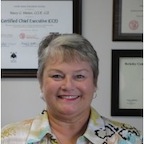Very good question.
|If you really wants to know the nuts and bolts of a credit unionthen working in a small one is the best place to learn aboutmanaging. However, managing is not the same as being aleader. Leadership is about moving an organization forwardand management is about making an organization perform. Management is looking inwards and Leadership is looking outwards atthe horizon and possibilities.
|Does it make a difference what size credit union you work in tobecome a leader, I do not believe that it does. I have knownManagers at large credit unions and Leaders at small creditunions. Your development depends on you and you alone, notthe size of the institution.
|
Cary J. Anderson
|President/CEO
|Main Street Financial FCU
||My experience over a 30 year career was that future credit unionleaders came from all quarters of the movement. That includedsmall credit unions, medium sized, large ones and not just from theprofessional ranks but from volunteers as well. Additionally,many leaders emerged from various state and national level creditunion trade organizations and some even came from peripheralentities such as vendors.
|Leadership is a quality imbued within the individual and willsurface over time regardless of any and all obstacles or any andall opportunities afforded those individuals. Credit unionleaders also come into the system oftentimes from other careerssuch as the military; regulators or even banking!
|I believe a person with leadership qualities will “rise to thetop” in whatever field of endeavor becomes their passion and as weall know, credit unions can easily become like a second “religion”to many folks. That passion is what will drive that person toinspire others to succeed and again, my experience taught me thatif others are following, I must be leading! Too often we seefolks who regard themselves as “leaders” who actually have nofollowers or use the skills of other people to advance their questfor success. Leaders on the other hand are “servants”. They serve the purposes and needs of whatever organization withwhich they have chosen to become a part. Their example is whatinspires others to follow their lead and emulate their “servant”attitude therefore making the organization a better place to workand increasing the chances that the goals and purposes of thatorganization will be accomplished.
|In my opinion, this is truly a situation where “size doesn'tmatter”. Large or small, it is the people and not theorganizations that will determine who is a leader.
|Ron LaMascus
|Former President/CEO
|Corporate CU of Arizona and Arizona CU League
|I would say that future leaders of credit unions would be betteroff in a small credit union, although the pay is not as high. In a small credit union, you learn every aspect of credit unionoperations, which becomes invaluable to you as a new leader. If you learn all aspects of credit union operations, then you canget a job with any credit union in any state or country. Youstill must have a servant's attitude to fulfil our mantra: “people helping people”. All credit unions understand thislanguage.
|
Nancy Mattox
|Former CEO
|Priority Federal Credit Union
||I started my credit union career at Leeway FCU in Okla.City. I started as a staff member of six, which included themanager at that time Jim Minor.
|We were $3 million in assets and almost totally manual in everything we did. In was 1974 at that time and computers were notin use. I did every thing a credit union offered to itsmembers and I did them every day. I did the collections,opened new accounts, took deposits and made withdrawals. Later of course I made loans and everything else that we did formembers. All of us were involved in the dailyofferings.
|I am convinced this is the most effective way to learnoperations. When I took the position at Fort Sill FCU in1979, we were larger of course, $20 Million and much moredepartmentalized. Learning in this environment would havebeen much more difficult because of the structure. I vote forlearning in smaller credit unions because I had first handknowledge of the effectiveness of this method.
|
Larry Armstrong
|Former CEO
|Fort Sill FCU
|From my perspective, a future credit union leader is betterprepared to meet the challenges of the changing industry if he/shehas been in a leadership position at a larger creditunion.
|The experience gained from a leadership position at a largercredit union enables the incumbent to participate instrategic-level initiatives and decisions. In contrast, smallcredit unions provide hands-on experience in a wide variety ofareas that are significantly more geared toward the operationallevel.
|In general, our future leaders need to be highlyexperienced and keenly focused on strategic issues and navigatingthe turbulent financial services industry as a whole ratherthan day-to-day operations which can be generally managed bymid-level management.
|eMentor
|CEO (who prefers to remain anonymous)
||In my career I have worked for a variety of organizations, smalland large. Both offer benefits and limitations that the otherdoesn't.
|For example, in a small organization you typically haveresponsibility for more areas and gain wider experience in ashorter period of time, and your knowledge and experience growsquickly. However, with limited financial and human resources, thatexperience can also be less comprehensive than you might get in alarger organization that has fellow employees that can help withideas from their own knowledge and experience that you can learnfrom.
|That's when being a member of a professional organization suchas the CUNA Councils, which can provide access to peers and subjectmatter experts who have additional viewpoints and expertise, isespecially so important.
|Less services and systems that you may find in a smallerorganization by virtue of what they can afford will also limit yourexperience. But, it may also help you develop more creative ways ingetting things done, a skill that can be applied and useful to evenlarger organizations.
|In a larger credit union, you may be more limited in exposure tosomething beyond your area of responsibility, another reason tojoin and actively participate in a professional group to gainexposure to what not only other credit unions are doing in yourposition but in other functional areas as well.
|You may have much more to work with regarding tools and systemsavailable in a larger organization, however, which might be moreadvanced than what a smaller CU is able to afford, or you may beexposed to something of great potential but with some risk that asmaller CU may choose to avoid.
|Bottom line? Whether choosing to work at a small or large CU,both can provide benefits to your career development and help youbuild your wealth of experience in both quantity and quality, justeach in different ways. Regardless of your CU's size, don't limityour exposure to only what your job involves. Volunteer to work inother areas of responsibility and whatever other projects your cuhas going on besides your own, and take advantage of professionalorganizations in filling the gaps in what a small or large cu canand can't give you in building your knowledge, experience, andcareer potential.
|Robert G. Reh
|Vice Chair of CUNA Tech Council/Chief Information Officer
|Nassau Financial FCU
|Complete your profile to continue reading and get FREE access to CUTimes.com, part of your ALM digital membership.
Your access to unlimited CUTimes.com content isn’t changing.
Once you are an ALM digital member, you’ll receive:
- Critical CUTimes.com information including comprehensive product and service provider listings via the Marketplace Directory, CU Careers, resources from industry leaders, webcasts, and breaking news, analysis and more with our informative Newsletters.
- Exclusive discounts on ALM and CU Times events.
- Access to other award-winning ALM websites including Law.com and GlobeSt.com.
Already have an account? Sign In
© 2024 ALM Global, LLC, All Rights Reserved. Request academic re-use from www.copyright.com. All other uses, submit a request to [email protected]. For more information visit Asset & Logo Licensing.











